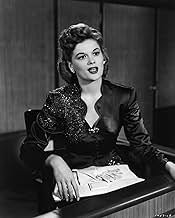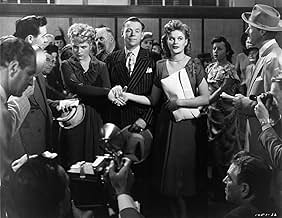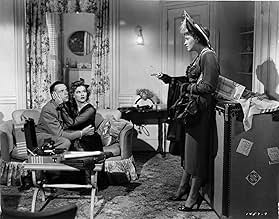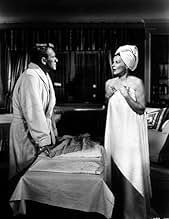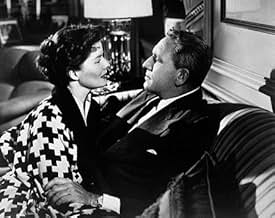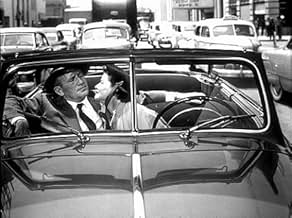AVALIAÇÃO DA IMDb
7,4/10
24 mil
SUA AVALIAÇÃO
O caso de uma esposa que atira no marido e na amante divide um casal de advogados, ele do lado da acusação, ela da defesa.O caso de uma esposa que atira no marido e na amante divide um casal de advogados, ele do lado da acusação, ela da defesa.O caso de uma esposa que atira no marido e na amante divide um casal de advogados, ele do lado da acusação, ela da defesa.
- Direção
- Roteiristas
- Artistas
- Indicado a 1 Oscar
- 3 vitórias e 5 indicações no total
Edward Andrews
- Kip's neighbor
- (não creditado)
Bonnie Bannon
- Woman in Courtroom
- (não creditado)
Charles Bastin
- Young District Attorney
- (não creditado)
Harry Baum
- Commuter
- (não creditado)
Joseph E. Bernard
- Mr. Bonner - Adam's Father
- (não creditado)
- Direção
- Roteiristas
- Elenco e equipe completos
- Produção, bilheteria e muito mais no IMDbPro
Avaliações em destaque
Lawyers Spencer Tracy (Adam) and Katharine Hepburn (Amanda) spend the film on opposite sides during the trial of Judy Holliday (Mrs Attinger) who is up on a charge of attempted murder after she shoots her husband Tom Ewell (Mr Attinger). Given that the film is a comedy, it can only really end one way for Judy Holliday.
Tracy and Hepburn undoubtedly work well together but the film has occasions where these two characters talk across each other and it just seems too shouty. It may be realistic but it certainly is not entertaining. Hepburn tends to over-exaggerate and lay on the dramatics when she acts and Spencer Tracy is clearly the better actor of the two. Actually, the best character is that played by Tom Ewell. He steals the film in all his scenes because he is genuinely funny. Judy Holliday is good if you can get past her terrible voice but musician neighbour David Wayne (Kip) is awful – not in the fact that he is meant to be an annoying character, but in the fact that he doesn't know how to convincingly portray a realistic person. He plays it gay one minute, then straight another minute, he's rubbish at acting. Nothing about his character rings true.
At the heart of the film is Hepburn's ridiculous notion about women's lib and some sort of feminist ideals – you know, the sort of thing that makes women annoying. Face the facts Hepburn, Judy Holliday had just tried to kill someone for goodness sake – it's got nothing to do with gender!
It's certainly a watchable film with some amusing parts (mainly with Tom Ewell), and some annoying parts (Katharine Hepburn and every appearance of David Wayne), and overall, it's more annoying than funny. Certainly not a classic as people seem to believe because they are told that it is. Everyone has done better.
Tracy and Hepburn undoubtedly work well together but the film has occasions where these two characters talk across each other and it just seems too shouty. It may be realistic but it certainly is not entertaining. Hepburn tends to over-exaggerate and lay on the dramatics when she acts and Spencer Tracy is clearly the better actor of the two. Actually, the best character is that played by Tom Ewell. He steals the film in all his scenes because he is genuinely funny. Judy Holliday is good if you can get past her terrible voice but musician neighbour David Wayne (Kip) is awful – not in the fact that he is meant to be an annoying character, but in the fact that he doesn't know how to convincingly portray a realistic person. He plays it gay one minute, then straight another minute, he's rubbish at acting. Nothing about his character rings true.
At the heart of the film is Hepburn's ridiculous notion about women's lib and some sort of feminist ideals – you know, the sort of thing that makes women annoying. Face the facts Hepburn, Judy Holliday had just tried to kill someone for goodness sake – it's got nothing to do with gender!
It's certainly a watchable film with some amusing parts (mainly with Tom Ewell), and some annoying parts (Katharine Hepburn and every appearance of David Wayne), and overall, it's more annoying than funny. Certainly not a classic as people seem to believe because they are told that it is. Everyone has done better.
(Note: Over 500 of my movie reviews are now available in my book "Cut to the Chaise Lounge or I Can't Believe I Swallowed the Remote!" Get it at Amazon.)
Two New York lawyers, husband Adam Bonner (Spencer Tracy) and wife Amanda Bonner (Katharine Hepburn), work out the marital tension and fight the sexual wars in the courtroom on opposite sides of a wife (Judy Holliday) shoots cheating husband (Tom Ewell) case. Adam's masculinity is seemingly challenged and his sense of justice offended by his wife's insistence on showing how smart she is while furthering her feminist agenda at the expense of the law. Will their public confrontation destroy their marriage, or will it ultimately make the bond stronger?
This still plays mainly because of the charisma of Hepburn and Tracy and the fine chemistry they create together. The script by Garson Kanin and Ruth Gordon is shallow and profound by turns, yet ultimately witty and pleasing. Judy Holliday as the lower middle-class Doris Attinger (on her way to her signature role in Born Yesterday (1950)) and David Wayne, as the song-writing neighbor who adores Amanda, shine in supporting roles. George Cukor's direction is clear, crisp and always focused. In the end we can see that Adam can be as feminine as Amanda can be masculine. The bit where Tracy cries real tears to win her back and then tells her, "We all have our tricks" is classic. It's his clever answer to her outrageous courtroom theatrics. Memorable as it illuminates their contrasting personalities is the early scene where the unsophisticated Doris is interviewed by Yale law school grad Amanda.
As a political movie, was Adam's Rib ahead of its time as a vehicle for feminist expression, or was it just another apology for male chauvinism, or was it balanced and fair? I'll give you a hint: the title is ironic. One of the things that made the Tracy/Hepburn romance work so well for so long was the creative balance they maintained in the battle of the sexes. The script by Kanin and Gordon carefully continues that profoundly true equilibrium.
Two New York lawyers, husband Adam Bonner (Spencer Tracy) and wife Amanda Bonner (Katharine Hepburn), work out the marital tension and fight the sexual wars in the courtroom on opposite sides of a wife (Judy Holliday) shoots cheating husband (Tom Ewell) case. Adam's masculinity is seemingly challenged and his sense of justice offended by his wife's insistence on showing how smart she is while furthering her feminist agenda at the expense of the law. Will their public confrontation destroy their marriage, or will it ultimately make the bond stronger?
This still plays mainly because of the charisma of Hepburn and Tracy and the fine chemistry they create together. The script by Garson Kanin and Ruth Gordon is shallow and profound by turns, yet ultimately witty and pleasing. Judy Holliday as the lower middle-class Doris Attinger (on her way to her signature role in Born Yesterday (1950)) and David Wayne, as the song-writing neighbor who adores Amanda, shine in supporting roles. George Cukor's direction is clear, crisp and always focused. In the end we can see that Adam can be as feminine as Amanda can be masculine. The bit where Tracy cries real tears to win her back and then tells her, "We all have our tricks" is classic. It's his clever answer to her outrageous courtroom theatrics. Memorable as it illuminates their contrasting personalities is the early scene where the unsophisticated Doris is interviewed by Yale law school grad Amanda.
As a political movie, was Adam's Rib ahead of its time as a vehicle for feminist expression, or was it just another apology for male chauvinism, or was it balanced and fair? I'll give you a hint: the title is ironic. One of the things that made the Tracy/Hepburn romance work so well for so long was the creative balance they maintained in the battle of the sexes. The script by Kanin and Gordon carefully continues that profoundly true equilibrium.
Adam's Rib turned out to be a delightfully cheeky romp with a kicker sense of humour, all acted out with ease by Spencer Tracy & Katherine Hepburn. I love how the film veers from the courtroom right into their marital home and becomes not just about a battle of wills, but a battle of the sexes as well, much fun watching this famous couple go at each other, both at work and at home. The film benefits greatly from the appearance of the lovely Judy Holliday in her breakthrough role, and it amused me greatly to see David Wayne playing a shifty character as I remember him fondly from the Twilight Zone episode Escape Clause in 1959. 8/10
Adam's Rib (George Cukor, 1949) is often hailed as the best "battle-of-the-sexes" comedy on celluloid, but it's beset with the same problems as the bulk of these Tracy-Hepburn vehicles: dated social observation that's tricky to navigate today, a lack of laughs and dramatic sequences that are just too heavy. The leads are a blissfully married couple who clash when they take opposing sides in a murder trial: assistant DA Spence leads the prosecution of wronged wife Judy Holliday (who is magnificent), while crusading feminist Kate leaps to her defence. Holliday plugged philandering husband Tom Ewell, you see, then fired wildly around the flinching floozy he was nuzzling up to, Jean Hagen.
The acting is absolutely stunning - universally superb - and there's smart use of newspaper inserts and a puppet show motif, but the material is spotty and chunky, with humour arriving in slabs rather than being weaved through the narrative. Kudos to former stage star David Wayne (he played Og in the smash Broadway version of Finian's Rainbow) for being so formidably irritating as Hepburn's extremely camp confidante and suitor. His reading of Cole Porter's specially adapted song Farewell, Amanda is a rare moment of respite in a teeming sea of annoyance. Hepburn asked her favourite director, Cukor, to favour Holliday in the filming of their scenes and leaked stories to the press about Judy's revelatory performance enraging both the leads. The ploy was designed to land her apprentice the lead in the screen adaptation of Born Yesterday, which she had initiated on stage. It worked - and she took home the Best Actress Oscar the following year.
As for Adam's Rib, it's impressive and memorable but, despite all that, resolutely not a classic.
The acting is absolutely stunning - universally superb - and there's smart use of newspaper inserts and a puppet show motif, but the material is spotty and chunky, with humour arriving in slabs rather than being weaved through the narrative. Kudos to former stage star David Wayne (he played Og in the smash Broadway version of Finian's Rainbow) for being so formidably irritating as Hepburn's extremely camp confidante and suitor. His reading of Cole Porter's specially adapted song Farewell, Amanda is a rare moment of respite in a teeming sea of annoyance. Hepburn asked her favourite director, Cukor, to favour Holliday in the filming of their scenes and leaked stories to the press about Judy's revelatory performance enraging both the leads. The ploy was designed to land her apprentice the lead in the screen adaptation of Born Yesterday, which she had initiated on stage. It worked - and she took home the Best Actress Oscar the following year.
As for Adam's Rib, it's impressive and memorable but, despite all that, resolutely not a classic.
Feminist attorney Katharine Hepburn has a new cause. She freely admits to doing a bit of ambulance chasing to get the case of Judy Holliday who shot her husband Tom Ewell after catching him in a love nest with floozy Jean Hagen.
Problem is that of all the cases that he could have been assigned, Spencer Tracy, Hepburn's husband and assistant District Attorney, he got assigned to prosecute Holiday. I guess Spence felt a little of what Bogey felt when Ingrid Bergman came back into his life in Casablanca.
Men down through the ages have certainly had the right to shoot the lovers of their wives when caught, why not women argues Hepburn. The case gets quite a bit of notoriety and of course it puts a strain on the marriage.
But the plot is sure the right vehicle for a lot of great lines and situations. This is Spence and Kate at their very best. Of the comedies they did, this is my favorite, just like State of the Union is my favorite among the more serious films.
Probably Adam's Rib's best known scene is when defense witness Hope Emerson picks up Spencer Tracy in a visual attempt to show feminine prowess and power. Even after seeing it several times you still will laugh yourself silly.
For Adam's Rib, George Cukor denuded Broadway of stars to play in support of Tracy and Hepburn. Making film debuts were David Wayne, Tom Ewell, Judy Holliday, and Jean Hagen.
Wayne is particularly funny and if Adam's Rib was made today, he'd certainly be more explicitly gay. He's the next door neighbor of Spence and Kate and some of the cracks Tracy aims in his direction would be considered downright homophobic. But let's face it, Wayne is an obnoxious scamp and that bit of vengeance that Tracy wreaks upon him and Hepburn in the climax involving licorice is a great cinematic moment.
Adam's Rib is Tracy and Hepburn at the very top of their game and I think folks who are not necessarily fans of their's would be amused.
Problem is that of all the cases that he could have been assigned, Spencer Tracy, Hepburn's husband and assistant District Attorney, he got assigned to prosecute Holiday. I guess Spence felt a little of what Bogey felt when Ingrid Bergman came back into his life in Casablanca.
Men down through the ages have certainly had the right to shoot the lovers of their wives when caught, why not women argues Hepburn. The case gets quite a bit of notoriety and of course it puts a strain on the marriage.
But the plot is sure the right vehicle for a lot of great lines and situations. This is Spence and Kate at their very best. Of the comedies they did, this is my favorite, just like State of the Union is my favorite among the more serious films.
Probably Adam's Rib's best known scene is when defense witness Hope Emerson picks up Spencer Tracy in a visual attempt to show feminine prowess and power. Even after seeing it several times you still will laugh yourself silly.
For Adam's Rib, George Cukor denuded Broadway of stars to play in support of Tracy and Hepburn. Making film debuts were David Wayne, Tom Ewell, Judy Holliday, and Jean Hagen.
Wayne is particularly funny and if Adam's Rib was made today, he'd certainly be more explicitly gay. He's the next door neighbor of Spence and Kate and some of the cracks Tracy aims in his direction would be considered downright homophobic. But let's face it, Wayne is an obnoxious scamp and that bit of vengeance that Tracy wreaks upon him and Hepburn in the climax involving licorice is a great cinematic moment.
Adam's Rib is Tracy and Hepburn at the very top of their game and I think folks who are not necessarily fans of their's would be amused.
Você sabia?
- CuriosidadesInspired by the real-life story of husband-and-wife lawyers William Dwight Whitney and Dorothy Whitney, who represented Raymond Massey and his ex-wife Adrianne Allen in their divorce. After the Massey divorce was over, the Whitneys divorced each other and married the respective Masseys.
- Erros de gravaçãoDuring the trial proceedings, a Black juror was in the first row, but the trial scene following the argument between Amanda and Adam where Adam walks out of the home, the jury makeup has now changed and the Black juror is not present. However the following day when court resumes for the jury verdict, the Black juror is back in the jury box.
- Cenas durante ou pós-créditosOpening credits are little curtains that go up and down, on a stage in a performance hall.
- Versões alternativasAlso available in a computer colorized version.
- ConexõesEdited into Hollywood: The Dream Factory (1972)
- Trilhas sonorasFarewell, Amanda
(1949)
Music and Lyrics by Cole Porter
Played during the opening credits and often in the score
Sung by David Wayne (uncredited), accompanying himself on the piano
Reprised by the voice of Frank Sinatra (uncredited) on the radio
Whistled by Katharine Hepburn (uncredited)
Sung a cappella by Spencer Tracy (uncredited)
Principais escolhas
Faça login para avaliar e ver a lista de recomendações personalizadas
Detalhes
- Tempo de duração
- 1 h 41 min(101 min)
- Cor
- Proporção
- 1.37 : 1
Contribua para esta página
Sugerir uma alteração ou adicionar conteúdo ausente



